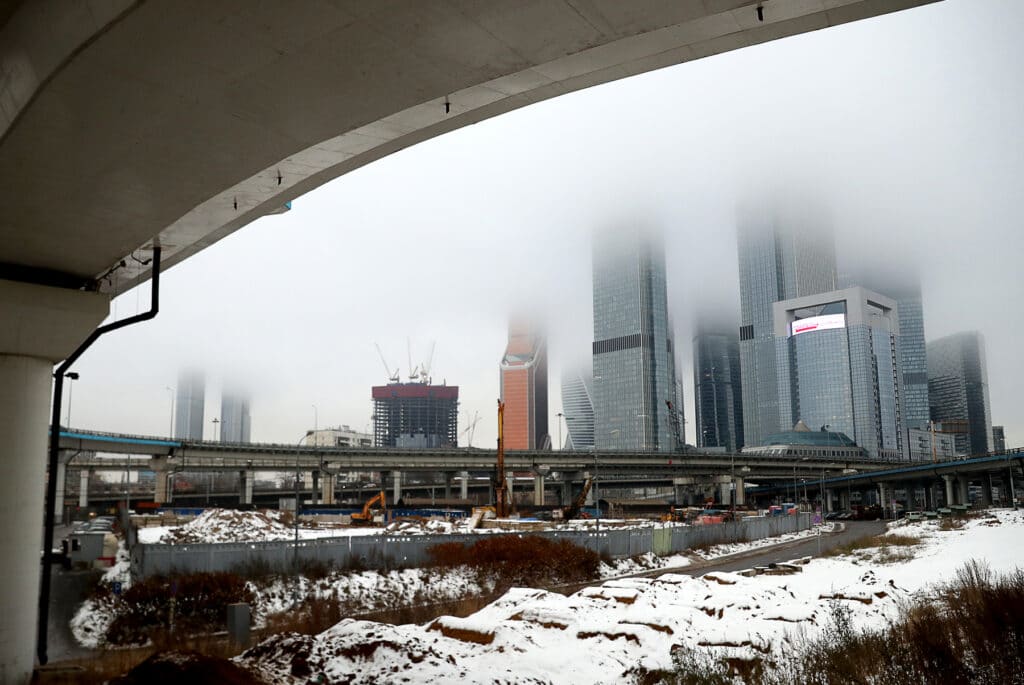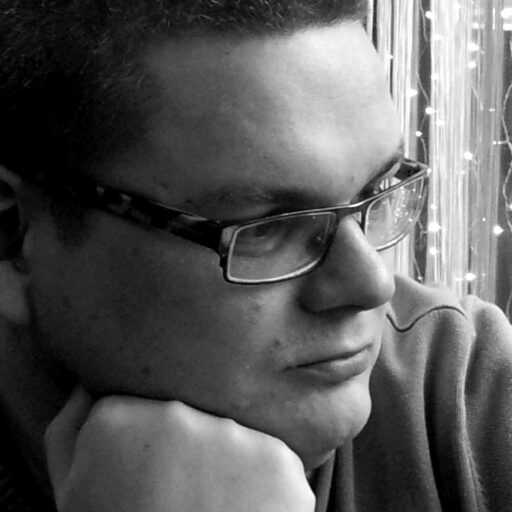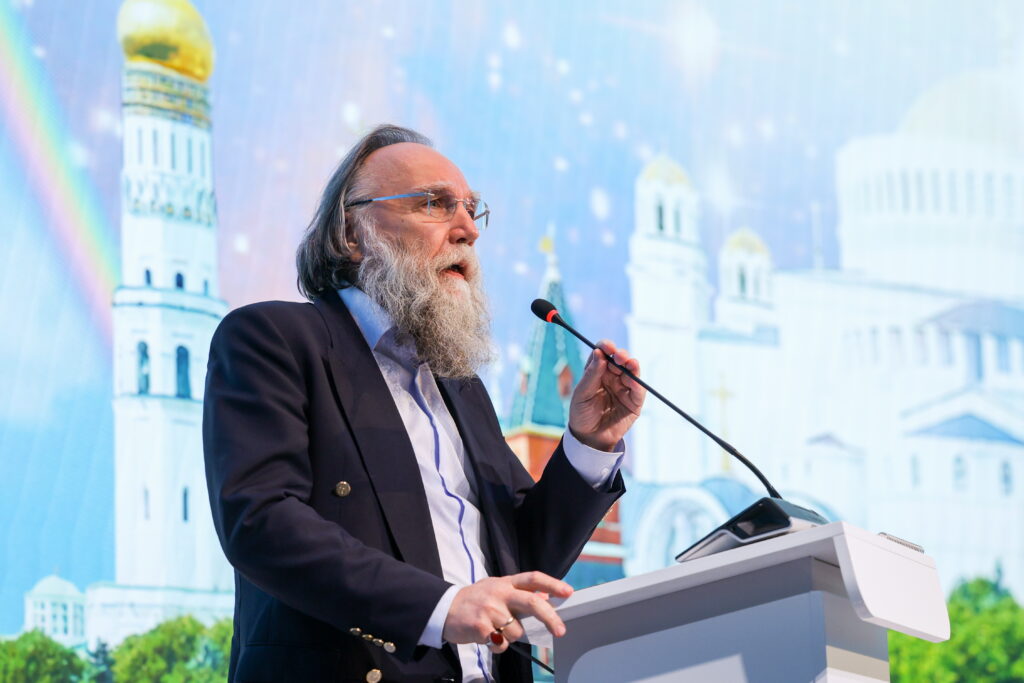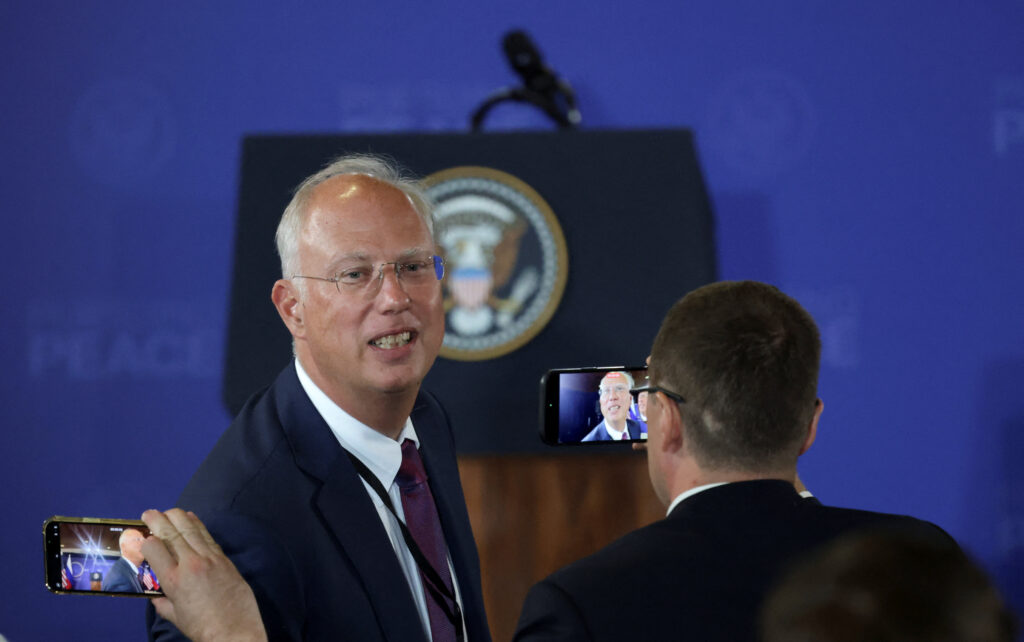Plans were set well in advance for the 75th anniversary of the Great Victory. It was to be a watershed event for a state long preoccupied with building a quasi-religious cult round the Second World War. The millions of lives the USSR paid for victory over Hitler’s Germany are the point of departure for Russia’s contemporary foreign policy. These sacrifices justify Russia’s reservations about so-called Western partners whose words of criticism of Russia are interpreted as attempts at the ‘revision of the results of the Nuremberg trials’ and almost a ‘revival of Nazism’. There’s no reason to smile: everything is dead serious. In Russia today, ad hoc propaganda clichés are rapidly becoming irrefutable truths. Those who mouth them are starting to genuinely believe in them and are brutally punishing those who disagree.
At the anniversary, the president himself was to be the front man. Back in late 2019, he delivered a lecture to leaders of several neighbouring countries on the true causes of the Second World War. It also became known that Putin had been working on an article about the war that would put an end to controversies among historians.
In tandem, there was another careful choreography to prepare: power transfer. At the start of 2020, the Constitution held that Putin’s last presidential term will expire in 2024. This made the elites nervous. Sure enough, political scientists soon devised elaborate schemes where Putin somehow retained power after leaving his post. But this issue needed clarity before the 2021 parliamentary election campaign.
Ancestral memory keeper
In the end, no one had to wait long. It turned out that all speculations about complex power transfer schemes were red herrings. the Constitution was to be rewritten so that Putin could run in two later presidential elections in 2024 and 2030. The country learned about this from the president’s January address to the Federal Assembly. Earlier, Putin had repeatedly said that there was no need to change the fundamental law. But that’s not saying much. He also assured citizens that the retirement age would never be raised. Essentially, the population has long been accustomed to how the president forgets his own promises.
Key details came from State Duma deputy Valentina Tereshkova, who referred to many “workers’ letters.” The president, who unexpectedly almost made it to the emergency parliamentary session on time, humbly accepted the request; one can’t resist the will of the people, after all. Tereshkova was chosen as the mouthpiece of this proposal for a reason: she was the first woman in space; she received congratulations from Nikita Khrushchev himself and published an enthusiastic piece about Leonid Brezhnev’s Constitution in the Pravda newspaper; and she is a living embodiment of contemporary Russia’s link to Soviet achievements. She is the personification of the idea that the incumbent head of state is a direct successor of ‘great ancestors’. Even the notion of workers’ letters, a typical Soviet propaganda trick, fits the concept perfectly. Though it does make skeptics smirk.
Some ideological theses asserting Putin’s new course were tacked onto the Constitution. In some ways, this is a smokescreen for the only real purpose of the reform – that is, to keep power in the hands of the incumbent. But there is more. Putin has cultivated a mystical view of his power. He most likely believes in his mission to protect the memory of the great war and the deeds of heroic ancestors, or the notion of a marriage as the union between a man and a woman, and so on.
For validation, amendments to the fundamental law suddenly needed a ‘popular vote’. Thus, the people would take responsibility for the decision, demonstrating unity with the nation’s leader.
But then, of course, a huge obstacle emerged.
Overrated virus
The Russian government held on like grim death, not acknowledging the pandemic, since the main events of the year – the Victory Day parade and the popular vote – involved masses of people. The president gave up only after Sergey Sobyanin, the mayor of Moscow, organised a tour of the Covid hospital in Kommunarka for Putin. The tour must have made an impression: the president left for his residence in Novo-Ogaryovo, outside Moscow. He now leaves only if absolutely necessary.
Putin announced national weeks off. He endowed governors with powers to combat the disease (the governors have long forgotten how to make independent decisions) and, having mastered video communication, began to make regular, peculiar addresses to the nation. In these, he invoked the heroic deeds of ancestors who defeated the steppe nomads in the Middle Ages. He even went so far as reprimanding the ancient Spartans for moral depravity.
Many observers speculated at the time whether a new era of coronavirus federalism was approaching. But it was another red herring. Putin was in fact overshadowed by regional leaders who tried to do something about people’s problems. It was not him but Sobyanin who made frequent appearances on TV. Indeed, the Moscow mayor somehow turned into the country’s leading epidemiologist. Insufficient aid, the manipulation of statistics and contradictory, often baseless bans could not but irritate the population. Still, people did not take to the streets. And even the strengthened position of the governors turned out to be imaginary. None of them was able to earn any political dividends from the coronavirus situation. The pandemic, of course, has dealt Russia a serious blow, like the rest of the world. However, it has not had any noticeable impact on Russia’s political situation.
The anniversary celebrations took place in truncated form. There were as many as two parades: one of them, a small one, was organised for Putin personally at the Kremlin on 9 May 2020. The other one, a massive, real parade, was held in June, when the first wave of the pandemic subsided. Even so, the authorities had to give up on the Immortal Regiment procession.
Still, the virus created splendid conditions for the nationwide vote in summer. The ‘unfavourable epidemiological situation’ justified a ban on protests. Voting was stretched over several days. And it was held under strange conditions: polling stations were set up in the yards of residential buildings, in car boots and even on tree stumps. It generated a lot of witty jokes on social media. And the result? An outcome of almost 80%, according to the government.
Belarusian mirror
The political idyll of 2020, a year when Putin gained the right to rule for another 16 years, was shattered not by the pandemic. Instead it was the presidential election in Belarus, rigged by Lukashenka on an unprecedented scale, and the protests that followed, which have truly shaped Russia’s domestic policy.
This is because the Putin regime’s number one political challenge has since been preparations for the Duma election. The real popularity of the ruling party in Russia is low; the pension reform severely damaged it, and the pandemic has not helped. To win an election under such conditions, Russia needs legislative backstops to prevent nasty surprises. The authorities started working on them without undue haste, having decided, for example, to use the best practices of the nationwide vote and to extend the single voting day to three days. More hurdles were introduced to make it difficult for independent observers to enter polling stations.
But then Belarusians took to the streets. And this came as a shock to the Kremlin. It turned out that even a random presidential candidate (and this is how Svyatlana Tsikhanouskaya has been perceived in Moscow) can become a serious problem if not controlled by the authorities. It also turned out that even the most brutal crackdown on protests could be unsuccessful. Surprisingly, this can happen even in the case of the Lukashenka regime, with the political field literally trampled, the opposition long crushed and independent media outlets almost non-existent. What can be expected in Russia, then?
Lukashenka’s mistakes have been duly noted, and the efforts to turn any election into a ceremonial event rather than a staged one have intensified. New draft laws have hastily been adopted. They practically rule out any possibility for the opposition to legally hold rallies. They criminalise even one-man protests. The ability to block political websites without a court decision has been expanded. The fight against Western social media outlets and video hosting sites is escalating; after all, that’s where state propagandists can be outsmarted by the opposition. The notion of a ‘foreign agent’ has been expanded. It now includes ‘an individual affiliated with a foreign agent.’ Essentially that is to disqualify any candidates who might rely on the support of Alexei Navalny and his team (he himself has not been eligible to run in elections for a long time; previous Duma members took care of that possibility). The Duma is going to introduce a ban on educational activities without the approval of the authorities, since a lecture on Renaissance art or on a Khokhloma painting could also be used to carry out anti-government propaganda.
Any attempt at political participation that is not inspired by the current authorities is treated as a crime. This is the main political outcome of Putin’s Russia in 2020. This is what is being honed now.
Putin’s outer reaches
The story of Navalny’s poisoning was the flashpoint on the political agenda in autumn and winter. After a joint investigation by Bellingcat, The Insider, Der Spiegel and CNN into the work of an entire special team of chemists and medical staff from the FSB who had been following the politician for several years, one might even read that ‘Putin had been cornered’.
The president’s impressive press conference showed that this was not quite the case. The big press conference is a traditional stage-managed show in which Putin sums up the year in a conversation with loyal journalists and ridicules, in his signature manner, a couple of disloyal ones, who are also given the floor. This time everyone was intrigued about whether anyone would ask a question about Navalny. How would the president respond?
There is no more room for intrigue. We learned from Putin’s answers that the possibility of assassinating a political opponent does not embarrass the Russian president. Except that he does not consider Navalny an opponent.
Undoubtedly, Navalny is a nuisance. He is a recognisable leader; he has headquarters in Russia’s regions and runs probably the only major genuine opposition network in the Russian Federation. His ‘smart voting’ strategy could create nasty surprises during elections. But the draft laws discussed above are designed to protect the government against such surprises.
Questions about Navalny do not corner Putin, although they clearly irritate him. This all fits into his ideological scheme. He is at war. He is fighting for traditional values, of which he is the guardian. The main enemy in this war is the ‘decadent’ West. According to this logic, any criticism of the regime is the result of an outside influence. Any dissenter is either a traitor or simply a fool who does not understand that the enemy is using them. The former must be punished, even annihilated, if necessary. That is an internal matter for sovereign Russia, in which no one should interfere. The latter needs to be given the right direction. Navalny, for example, is an enemy linked to the CIA. Putin has been very clear about this.
The wave of repressive laws, endless bans and curtailment of civil liberties – all this only appears chaotic on the surface. It is an orderly universe where the forces of good, led by Putin, are fighting forces of utter evil.
Everything is interrelated; nothing is accidental. Putin is probably convinced that he is always right: the course towards isolationism and a break-up with the West are a reaction to the West’s constant conspiracies, which, in turn, justifies tightening the screws at home.










